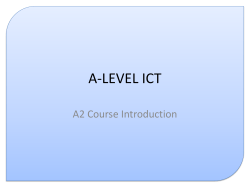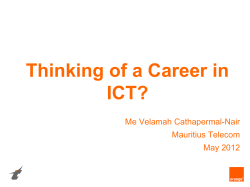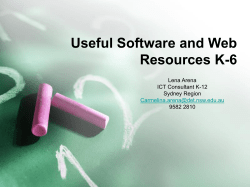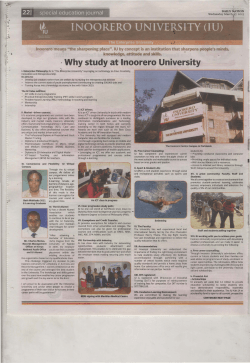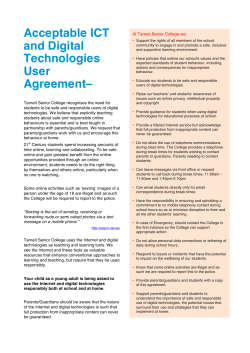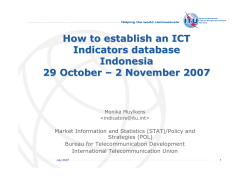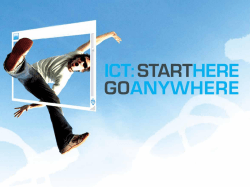
ICT Rich Learning Frankston High School (Melbourne, Australia) Travis Smith
ICT Rich Learning Travis Smith Frankston High School (Melbourne, Australia) About FHS… • 1650 students • Largest notebook program in a State school in Australia. • No funding from the State for notebooks • Middle class socio-economic area • Above expected academic performance • Non-compulsory notebook program AP – ICT / HR • • • • • Strategic position Manage all technology in school Oversee notebook program Manage Computer Service Centre Purchase/leasing of hardware and software • Oversee staff PD on use of ICT • Manage online curriculum support staff • Guide curriculum use of ICT History of Laptops for Teachers • DE&T Initiative • Introduced in 1998 • AU$8.40 or AU$11.70 per fortnight (about R70 per fortnight) • Started slowly – now most have them • Needs to be driven by systemic changes - online report writing - email as main form of communication - Portal / Intranet curriculum delivery • All teachers need network access (wireless) Evolution of teacher use Then…. • Word Processing / Creating worksheets (to print) • Emails (mostly social) • Teaching with technology / planning classes and activities And now… • Integral to every teacher’s day • Portal access / Email / Intranet access • Creation and disseminating curriculum online / students submitting work electronically (examples later) • Communication tool (teacher to teacher), (teacher to student), (teacher to parent) Unrealistic expectations??? • Staff are already behind the 8 ball! • Are students born predisposed not to cope with or be motivated by current models of schools? (well….most schools) • Teachers need to be able to create a classroom environment which remotely reflects their world outside of school. I hear and I forget, I see and I remember, I do and I understand (Unknown Author) BUT… the ‘I do…’ part must be in a curriculum relevant context PD - A shifting focus Skills based Curriculum based Multi-dimensional PD One dimensional PD (weekly sessions) ICT Curriculum Facilitator 5 x Technology Mentors Weekly sessions ICT Curriculum Facilitator Learning Technologies Coordinator Teacher • Too busy • Enough to do • Some don’t like risk taking • IT Staff • Provide technical expertise • Don’t know classroom • Unaware of what • Not enough time to be creative practicesteachers are doing Focused on classroom in classes • Focused on ICT Curriculum facilitator bigger picture • Sees many strategies and adapts them to other classroom situations Student • Doing the same thing over and over again • Love new technologies ICT Curriculum Facilitator Design and Support • Someone to talk to regarding ICT teaching possibilities • Show teachers available resources – – – – Activebook reader (Schoolkit) Learning Federation objects Websites Software programs • Photostory, Inspiration, Producer, OneNote etc • Creating digital resources for the classroom • Software evaluation • Support the teacher in the classroom to introduce new software to students • Team teach with those that are not confident in the use of ICT (varies with each teacher) • Influencing the big picture How can she make a difference? PowerPoint Inspiration Producer Movie Maker Websites Creative Student learning Activebook reader Office Photo Story Learning Fed. objects Geometer Sketchpad Reality check… Probably the most significant blocker to vast improvement in technology skills in teachers is a lack of access to technology for their students! It’s too easy to be all too hard! “There’s no point me learning this ICT stuff, I can’t get my kids into a computer lab anyway!” Y Generation • Y or ‘why?’ • Multi-tasking (therefore easily bored) • Are they engaged? A change in pedagogy is required….(University) • Skills required by our students for employment • • • • • • Analytical/Research Skills Computer/Technical Literacy Flexibility/Adaptability/Managing Multiple Priorities Problem-Solving/Reasoning/Creativity Self-Motivated/Ability to Work With Little or No Supervision Adaptability/Flexibility. Randall S. Hansen, Ph.D. and Katharine Hansen http://www.quintcareers.com/job_skills_values.html Classrooms must evolve • “Our students have changed radically. Today’s students are no longer the people our educational system was designed to teach” (Prensky, 2001) • Could classrooms at your school engage Leeroy??? Research (Notebooks) • Access to technology improves students' writing and encourages collaboration among students. • Students who use laptops are more involved in their schoolwork. • Teachers who use laptops use a more constructivist approach to teaching. • Teachers who use laptops feel more empowered in their classrooms. Rockman Et Al. (2001) Anywhere Anytime Learning program Are classrooms relevant? Today’s digital kids think of information and communications technology (ICT) as something akin to oxygen: they expect it, it’s what they breathe, and it’s how they live. They use ICT to meet, play, date, and learn. It’s an integral part of their social life; it’s how they acknowledge each other and form their personal identities. John Seely-Brown www.johnseelybrown.com “…nowadays being without a computer is like being without hands”. OECD International Student Network Digital natives vs digital immigrants….please…at least try to speak the same language (Prensky, 2001). Are classrooms relevant? Today’s generation of students communicate in a language that many academics don’t yet understand. It’s an ever-evolving language of interpretation and expression, an interactive approach to learning, creating, and responding to information through a complex montage of images, sound, and communication. Students are pushing learning into a new dimension; it’s a mistake to continue to try to teach them in time-worn ways. Their choices of communication need to be diversified to include, for example, visual interpretations of texts and historical figures or soundtracks for poetry. Students can take advantage of the enormous resources of the Web, transforming what they find there by using digital technologies to create something new and expressive. The potential to invigorate investigation in the humanities with this approach is clear. John Seely-Brown www.johnseelybrown.com DANGER – assessment!! “I am not absolutely certain that student achievement is higher as a result of my laptop model, but I plan to examine this. One of the ways I will do this is compare students' standardized test scores with last year's scores. I hope to see that the types of activities I ask students to do on their laptops enhances their learning by making them better readers, writers, and problem-solvers. I do know that my students love using the laptops.” Do current means of assessment measure skills or digital literacies – NO! Are students exposed to higher levels of ICT better prepared for life beyond school – YES! Identifying an educational need • In the process of ‘re-imagining’ the school, ten years ago, the expanded use of computer technology was identified as part of the vision • Selected as part of an ACER research project (1992 – Innovation and Best Practice Project) • Computelec partnership began through the provision by DE&T of 25 notebook computers Notebook Program • Largest state school notebook program in Australia. • 650+ notebook students (1650 students). • 7-8, notebook and non-notebook classes. • 9-10 English, Maths, Science notebook classes. • Parents purchase the student notebook either privately or through a recommended provider Teaching and Learning • Teaching with technology vs Learning with technology • Relevant!!!!!! – Stimulating/Motivating/Engaging • Online curriculum • Truly paperless classroom (including marking) • Internet, intranet and email use increased exponentially. • The benefit for non-notebook students • Individualised curriculum • Positive flow on to learning at home • Breaks down the walls Classrooms…. • • • • • • Most dynamic classrooms NOT teacher centred Constructivist / student centred True “in time learning” - skills Research – current and changing Communicating with experts, prominent people, organisations, peers overseas • Students are the experts – “Does anyone know how to…” environment. • Teachers need to be allowed to experiment….if they fail – support is the key! Significant changes… • Wireless (2001) • Online marking toolbar • Tablets for staff and students – – – – Marking for teachers OneNote Collaboration Art / LOTE / Maths etc… Wireless DP + Tablet = Digital whiteboard on steroids Food for thought Education is the only facet of modern society where the benefit of ubiquitous technology is still being debated…. ….but schools are supposed to prepare students for all other facets of modern society. Finally… “Back in the 1950s the US was somewhat embarrassed by the fact that the fastest transatlantic ocean liners belonged to European countries. France and Britain had faster ocean liners than they did, and at the time, of course, crossing the Atlantic was the essence of important travel. Ministers and all important people were into crossing the ocean quickly. So American resources of technology and money were mobilised and led to triumph. They made the fastest boat in the world, the S.S. United States. In the very same year the first commercial jet plane flew and it became totally irrelevant which boat could travel faster across the Atlantic. I’d like you to hold that in mind when thinking about school. Are we trying to perfect an obsolete system or are we trying to make the educational jet plane?” Seymour Papert - 2001 Online Curriculum Showcase Travis Smith - tsmith@fhs.vic.edu.au
© Copyright 2025

